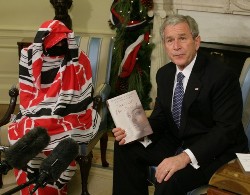Sudan’s Bashir cannot escape accountability: Bush
December 10, 2008 (WASHINGTON) – The US President George Bush expressed frustration at the rate of deployment of peacekeepers in Darfur and concluded by stating that Sudan’s ruler will be held responsible for the conflict in the region.

Bush said, “it’s very important for President Bashir of Sudan to know that he cannot escape accountability; that if he so choose, he could change people’s lives, the condition of people’s lives very quickly.”
The statement resembles previous positions taken by U.S. officials that coupled the ICC issue with demands that Sudanese authorities work to improve security and humanitarian aid in Darfur, the westernmost region of Sudan.
But it also represents a much more forceful position on the ICC case than previously articulated by the president. When asked about the indictment in July, Bush said, “Well, we’re not a member of the ICC, so we’ll see how that plays out.”
The comment follows a similar warning from the French president on Monday, who said “We need the help of the Sudanese government to finally find peace in Darfur. But President Bashir has very little time to decide, his fate is in his hands.”
If the court issues an indictment, there could be “serious consequences” for the UN Mission in Sudan (UNMIS), said senior Sudanese government officials in direct warnings to the UN secretary-general and his special representative. UNMIS is tasked with monitoring the north-south peace agreement, which was signed in 2005 after the war in Darfur had already begun.
The Bush administration has pushed for a 26,000-strong peacekeeping force in Darfur, about half of which is currently in place. Deployment of the joint UN-African Union force is slowed by insecurity, according to the UN secretary-general’s latest report on the mission, which pointed to a backlog aggravated by trucking contractors’ fear of attacks.
The United Nations has for months been seeking six attack and 18 transport helicopters to support the force. But US special envoy to Sudan Richard Williamson told UN chief last March that the UN should not be hung on the issue of helicopters needed by the Darfur force.
“I am frustrated with the pace of activities,” said the president after meeting with Dr. Halima Bashir, a Darfuri woman who was tortured and gang-raped after witnessing government militia surround a school and rape dozens of girls and their teachers.
Bush stressed that the United Nations must expedite sending troops to the region, where 2.7 million people are displaced by attacks.
“The United States continues to stand at the ready to provide airlift,” said Bush, referring to negotiations with the UN for the U.S. to fly troops and equipment to airports in Darfur, bypassing hundreds of miles of dangerous roads. “The pace of action out of the United Nations is too slow,” he added.
Political process in the Sudan continues to be facilitated by Qatari mediators and an AU-UN mediator, but rebel leaders are reluctant to negotiate with the ruling party, which itself is at odds with its 2005 peace partner over national security legislation, election preparations and other issues.
“We support the mediation process by the AU-UN mediator,” specified Bush. “In other words, we recognize in order for there to be peace in Darfur that parties must come to the table in good faith and solve the problems.”
After his remarks, Bush invited Dr. Bashir to speak. She said, “I’m very happy because now Darfur victims’ voices is heard in the White House and to the American people and to the world.”
Teh Darfuri refugee peered out from behind a striking red, white and black head-to-toe covering that White House aides said she put on just before journalists entered the room, as protection from possible reprisals.
Her message to the president was “to do more work in Darfur to handle the situation … and just to stop the genocide and the crisis in Darfur, because it’s been now more than five years and we do not need to wait anymore. We need real action.”
Dr. Bashir is the author of the book “Tears of the Desert,” which describes her life before the war and her account of survival. Meeting with her and reporters at the White House, Bush remarked, “This good soul brings firsthand accounts to what life is like in Darfur. She has witnessed violence, deprivation, and she carries a message of a lot of people who want our help.”
(ST)

Freedom Fighter
Sudan’s Bashir cannot escape accountability: Bush
To President Bush,
This is the best gift of Eid Al-Adha to the people of Darfur and to all the Sudanses as well. While praising you and your outgoing administration for being so kind to our people that your were able to draw world’s attention to Darfur crisis, I hope incoming president Obama will not only follow your foot steps, but also, live up to his compaign message for creating no fly zone
Brad
American
I am an American who stumbled upon this article while learning about the Darfur atrocities. I agree with you all that my country should do much more than we are to help the downtrotten Darfur region.